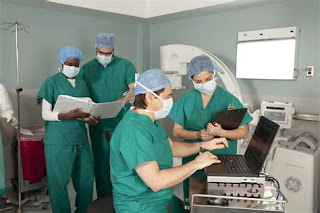Surgical Neurophysiologist: An Obscure but Well Paid Technical Career in the Operating Room
In my work as a career consultant I often come across newer, unknown, but lucrative occupations. Have you ever heard of a surgical neurophysiologist, a field also called intraoperative neurophysiological monitoring (IONM)? This occupation recently came to my attention in a court case on which I was providing vocational expert witness testimony. Although I've reviewed thousands of work histories over the years, this was a first for me. Further, a pre-testimony search for the occupation brought up little useful information in credible career information sources, or even when entering the occupation name in search engines. So, at the hearing, I took the opportunity to question the person who worked in the occupation and then did some further post-hearing research.
If you are considering entering a medical/technical career or making a career change, what I found may be important to you. Although the occupation is obscure, it is growing, important, challenging, uses emerging technology, and can be a meaningful and lucrative choice if you are interested in healthcare. It may also be a stepping stone to further career progression in the medical field. But you may need to be persistent and resourceful to find a point of entry into surgical neurophysiology.
So, what is a surgical neurophysiologist? It's a technical specialist who records neurological information on patients in the operating room during surgery, using computers and electronic measuring devices. The information is used by surgeons to understand what is happening during surgery and to prevent neurological deficits from occurring after the surgery. The field is quite new and at present there are no state or national licensing requirements to practice. So for now, while the field is relatively anonymous and developing, there is opportunity to get in on the ground floor. In 2017, one source stated there were only about 3000 surgical neurophysiologists nationwide.
Entry level preparation varies, but generally requires a bachelor's degree with a health related major, followed by short term training, preliminary experience, and passing a certification exam. Hiring is usually by private companies that provide contracted surgical neurophysiologist services to hospitals. These companies also also provide the training, clinical experiences, and support for completing certification for those they hire for this role. Rarely, hospitals may also hire and train directly. The work is complex and involves continuing education and development after being certified and employed. Some schools have even begun to offer masters and doctoral level training programs which allow for advanced roles.
Average annual salaries for monitoring are in the vicinity of $80,000 annually, but reported figures vary depending on source. Salary.com shows an average of about $78,000 nationwide with a range of $66,000-$83,000 in 2019. Another average figure I found was $88,000 annually. It's difficult to pinpoint average salaries better than that since so few sources that report salaries even cover this occupation.
Finding an entry point into this field can be a challenge. If you have interest and want to explore further, check out the following resources and try to find a surgical neurophysiologist with whom you can speak directly; or a company that hires and supplies practitioners to hospitals: https://hpnonline.org/services/surgical-neurophysiologist/, https://www.asnm.org/page/History#

Comments
Post a Comment